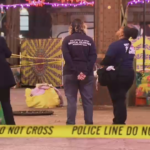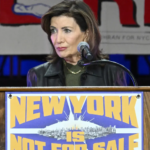By Sadia J. Choudhury
New York | October 27, 2025-New York Assemblyman and mayoral hopeful Zohran Mamdani has found himself at the center of a fresh controversy, just weeks before the city’s mayoral election.
During a recent community event, Mamdani emotionally recalled the story of his “hijab-wearing aunt” who, he said, was too afraid to ride public transportation in the aftermath of the September 11 attacks. The statement drew widespread empathy — until a new report revealed a different side of the story.
According to an investigation by the New York Post, the woman Mamdani referred to was not his “aunt,” but actually his father’s second cousin. While she was indeed a close family member, the clarification sparked questions over whether Mamdani’s narrative was exaggerated for political effect.
Questions Over “The Aunt’s Story”
The revelation quickly ignited debate on social media, with critics accusing the progressive lawmaker of using a “manufactured story” to appeal emotionally to voters.
Republican Senator J.D. Vance criticized Mamdani sharply, saying:
“Instead of standing with the real victims of 9/11, Mamdani turned his so-called ‘aunt’ into the center of attention. It’s political theater, not truth.”
Mamdani Responds
In response, Mamdani defended his remarks, explaining that his reference was cultural rather than literal.
“The woman I spoke about was Zehra Fuhi — my father’s cousin. I’ve always called her ‘auntie,’ as is customary in our culture. She passed away a few years ago,” he clarified.
Mamdani emphasized that his intention was not to mislead, but to highlight the fear and stigma faced by Muslim Americans after 9/11.
Political Reactions
Opponents have since accused him of using emotional storytelling as a campaign tactic, while supporters argue that the story reflects genuine experiences of discrimination within Muslim and South Asian communities.
Known for his strong stance against Islamophobia, Mamdani previously said:
“I am Muslim, I am African, I am a New Yorker — and I will never hide any part of my identity again. I choose to live in the light.”
Broader Context
Analysts note that the controversy underscores a recurring challenge in modern politics — the thin line between personal testimony and political narrative. For many, Mamdani’s story still resonates as a reminder of the real fear Muslim Americans endured after 9/11, while others see it as a cautionary tale about authenticity in campaign rhetoric.
Conclusion
Whether this dispute weakens or strengthens Mamdani’s standing remains to be seen. But one thing is clear: in today’s political landscape, even a deeply personal story can become a lightning rod — testing not just the truth, but the tone of public trust.





